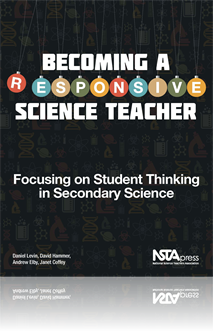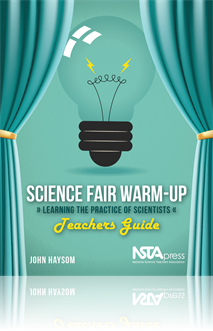All Book Chapters
Book Chapter
The Need for Responsive Teaching
"Responsive teaching" means something that goes beyond the images of teachers presenting information or crafting experiences, to teachers really focusing attention on student thinking. It is closely connected to assessment, not just in the sense of e...
Book Chapter
The Refinement of Everyday Thinking
This chapter is in two parts and has two interwoven purposes. The first part focuses on everyday thinking, dividing discussion into sections—“Everyday Knowledge” and “Everyday Reasoning.” The purpose here is to talk more about science and s...
Book Chapter
This chapter provides a brief overview of the set of cases and provides four suggestions—temper the impulse to evaluate the teacher; focus on understanding the students’ thinking as inquiry; support interpretations with specific evidence from the...
Book Chapter
This chapter presents the first in a pair of cases about classes on the same topic—a question developed by Izzy Kovach, one of the more experienced teachers. She found an article about a "novel commensalism" wherein live, blind snakes live unharmed...
Book Chapter
This book of case studies came from the final year of a three-year research collaboration among a team of teachers and project staff entitled What Influences Teachers’ Modifications of Curriculum? (National Science Foundation ESI 0455711). The cas...
Book Chapter
The Rime of the Ancient Mariner
This case study documents what happened in Jenny Tamper's 10th-grade biology class when she showed her students a stanza from Samuel Taylor Coleridge's poem "The Rime of the Ancient Mariner," and asked them to explain what they thought it was describ...
Book Chapter
Ninth grade students at two different schools worked on the same conceptual questions about freely falling objects. This chapter presents the first of two case studies about what happened. In this case study, Matt Reese analyzes his students' written...
Book Chapter
This case study describes what happened in David Hovan's ninth grade "Conceptual Physics" class when he asked students to answer the conceptual question set introduced in the previous chapter. He then brought the class together to discuss their respo...
Book Chapter
This book provides materials to support practices of learning to attend to student thinking, in classroom discussions and in student work. It serves to highlight some of the things to recognize in students’ thinking, both in terms of progress towar...
Book Chapter
Variables And Their Controls: Isolating Variables: Reducing Complexity
Determining the best hull design is a challenging problem. Scientists proceed systematically about designing a hull that minimizes water resistance. Drawing on their experience, they would probably begin by trying to make a list of all the factors (v...
Book Chapter
This chapter presents 15 Starting Points—some address physics, some chemistry, and others biology, while some have an engineering flavor. All students, regardless of whether or not they have previously experienced a science fair, are invited to cho...
Book Chapter
An Overview of the Nature of Scientific Inquiry
There are many possible answers to the question, "What is the nature of science and scientific inquiry?" This chapter provides students with experiences through which they can understand what science is all about and the sort of demands a scientific ...
Book Chapter
Scientific inquiry often proceeds qualitatively, especially at the early stages of an exploration into a new phenomenon. The scientists' goal seems to be to map what they perceive to be the significant features of the phenomenon, with a view to sorti...
Book Chapter
Have you ever asked yourself why scientists use numbers? It's an intriguing question. This chapter, which introduces the numbers game, highlights some of the reasons since there are many and they are interrelated. The activities in this chapter will...
Book Chapter
From an early age, children have a good idea of what being fair means. In a fair test, everything is treated in the same way (controlled), apart from that which is deliberately changed or varied. In this way, scientists can determine whether a change...




